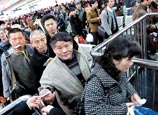

Khalid Malik, the director of Human Development Report Office (Photo by Gao Yinan/ PD Online)
The key message contained in the Report that economic growth alone does not automatically translate into human development progress would be seen as a warning for China’s eagerness for quick success and instant benefit in the course of urbanization.
Therefore, in the next few years’ urbanization, efforts should be made to the transition to service economy. Pro-poor policies and significant investments in people’s capabilities - through a focus on education, nutrition and health, and employment skills - can expand access to decent work and provide for sustained progress.
The Human Development Report 2013 by UNDP suggests four important aspects to facilitate a sustainable development for developing countries such as China: enhancing equity, enabling voice and participation, confronting environmental challenges and managing demographic change.
According to the newly launched Report by UNDP, China’s HDI increase to 0.699 (up from 0.695 in 2011) sees the country remain above regional and BRICS averages, which come in at 0.683 and 0.655 respectively.
Among the underlying indicators that comprise HDI, China's life expectancy at birth has increased by 6.7 years since 1980, mean years of schooling by 3.8 years and expected years of schooling by 3.3 years. China’s Gross National Income per capita has increased 1,416 percent since 1980.
"Over the past decades, countries across the world have been converging towards higher levels of human development, as shown by the HDI," the report says. "All groups and regions have seen notable improvement in all HDI components, with faster progress in low and medium HDI countries. On this basis, the world is becoming less unequal.”

















 Gangs smuggling case involving refined oil seized in China's Zhejiang
Gangs smuggling case involving refined oil seized in China's Zhejiang


![]()
